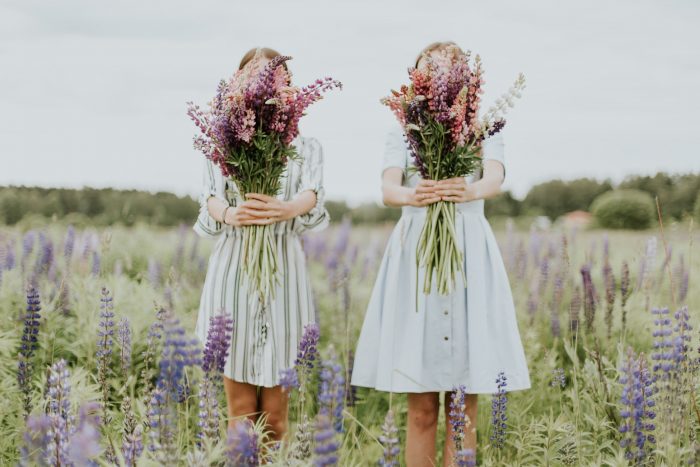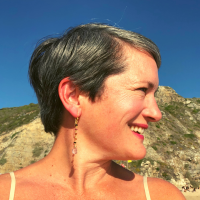A while back, a friend and I “broke up.” Actually, she broke up with me.
And it hurt. Hell, it still hurts.
But somehow, despite her telling me not to contact her. Despite missing the warm, creative connection we shared, I’m grateful for what happened.
Is that really true? I wasn’t sure for a while but, yes. It is true.
One of the saving graces of any painful situation is knowing that—in the heaviest of heartbreaks, the crunchiest of conflicts, the hardest of hurts—there’s always an opportunity to turn sh*t (or dross) into gold.
I’m a devoted apprentice to that kind of alchemy. But I can only grasp its slippery magic if I’m willing to let go of my defenses and dig deep into the messy, gritty, aching core.
Transcendence is possible but only if I don’t run away. The gold only comes when I stay: stay in the discomfort, stay in the seeing, stay in the feeling. Stay with myself.
This world is full of busy, distracted, successful, and suffering humans.
At best, as Ram Das said, “we are all just walking each other home.” At worse, we are missing each other. Forgetting to see the tender-hearted child inside. Judging each other as inferior or inadequate. Too much. Too little. Too sexy. Too timid. Too intellectual. Too emotional. Too crazy. Too sensitive.
Too human?
Of course, not everyone can be one of my besties. Not everyone “gets” my overly poetic, sometimes pushy enthusiasm. I can be inopportune, and not everyone wants to roll up their sleeves and dig in.
But I do. I live for it. ‘Cause I know, as the old saying goes: “There’s gold in them thar hills.”
Social alchemy means talking about the stuff a lot of people don’t want to talk about. It means feeling and sometimes even expressing feelings others may deem “low vibration.”
It requires looking at blind spots, knocking on the door of the unconscious, and then listening and sharing what’s really going on—especially by acknowledging and revealing body sensations.
Whenever I wholeheartedly engage in these practices, I always end up feeling more alive. Playing this way, if with no one else, at least with myself, I breathe easier and deeper.
I’ve found that when feelings are honored and sensations are accepted (not denied, ignored or shamed), inevitably the joy returns. And the laughter too.
I’ve watched this process unfold so many times, I trust it in my bones.
That’s why I’m dedicated to accepting simply being human—not getting lost in tortuous analytical talk or slipping into the heady realms of disembodied spiritual ideals.
Practicing this kind of alchemy is the opposite of constructing air-tight stories that keep our self-image intact. Nor is it about perpetuating rigid perspectives that pave the way for some of us to stay armored and unattached (while desperately seeking distractions from what we’re really feeling through self-development workshops, drugs, sex, or success).
It might make a person feel better in the short term but it’s also not about indulging in the sugar-highs of superiority or exclusivity.
It’s about being openly, humbly, vulnerably human.
During our break-up, my friend reminded me that I had always asked her to bring me her truths. What she couldn’t seem to see was that the “truths” she was sharing landed on my hearth as judgements.
They felt like judgments about my relationship, my sexuality, and my insecurities. An especially confounding part for me was how these judgments were wrapped up in the language of spirituality and self-development.
Spiritual ideals that put others down aren’t really spiritual.
The hardest knot for me to untangle was this: I was afraid she might be right. Underneath the arguments about what had happened (which really don’t matter), I became aware of a tiny, terrified voice, barely whispering inside: Maybe there was something wrong with me.
That’s how I had gotten so derailed by someone deciding to end a friendship (one that I was deeply invested in growing). After all, friendships are always changing, shifting, and even, sometimes, ending.
The underlying truth was that my childhood wounds suddenly had me under their stomach-turning spell. Nothing either of us had done, in my view, was worthy of a break-up. Nevertheless, I was suddenly plunged into profoundly dark and cold psychic waters.
After churning in those waves for a time, I saw how I still secretly feared that the ways I had been unLoved as a child would always, inevitably, be the ways I would be unLoved as an adult. I faced a deep-seated dread that somehow, inescapably, I was unlovable.
But my Soul knows that’s a lie.
I’ve been thinking a lot about a verse you may have heard from the Bible. It goes something like this: When I was a child, I spoke as a child, I thought as a child, I understood as a child. But now that I am an adult, I have put away childish things.
What childish things do you need to put away?
Here’s what I’ve come up with: When I was a child, I couldn’t help but let others’ unLove break my little heart. But now that I am (eh hem, fingers crossed) an adult, I know that I can always choose to open to the Love within me; and I can also choose to learn those distances I need to sustainably love others (—which is the best definition of a boundary I’ve ever heard).
I am willing to let my generous, gorgeous friend go (because she asked me to). But I’m not willing to let myself go.
I will look at where I need to grow and exactly how I hurt my friend. But I’m no longer willing to let the judgments of others seep into my brain and body, polluting the air of my inner world.
In going no-contact, my friend re-triggered a childhood wound I had not healed. I had to let myself wail and dance through the tears…and ultimately, thankfully, I chose not to drink that stale poison.
Love is the only antidote.
Every one of us has the power to let our suffering teach us. Let it polish us. Let it break us open.
When we do, the spiritual bubbles pop. The clenched eyes and fists relax open. At last, we surrender, letting go of what we cannot change. Then we become sovereign.
In returning to an awareness of our innate innocence, we touch what Meher Baba called “the perennial spring of imperishable sweetness which is within each and all.”
We touch Source.
I wish my friend would touch that place with me, remembering and valuing the sweetness we shared. But I’m grateful that in ending our friendship, she reminded me that no matter what, I can always drink from that precious well within myself.
From there, right seeing and right action are both possible.
The whole world desperately needs us to wake up and down, into our humanness. It’s the only way to excavate our shared humanity.
Let’s keep finding and walking each other home.
~









Read 6 comments and reply